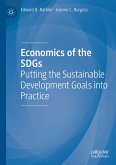This contributed volume explores the relationships between politics, economics, and evaluation. With a special focus on Greece, it addresses how evaluations within different sectors impact policymaking and explains what this means for sustainable development.
Featuring interdisciplinary perspectives on economic policy evaluation for inclusive and future-forward public policy, the chapters rethink and reform evaluation to meet modern economic challenges.
The book outlines the concept and principles of resource allocation in evaluation, offering a framework for economic transformation. It highlights the role of evaluation in achieving sustainable development.
It provides a new way to measure the quality of public policy, governance, and economic policy.
Panagiotis E. Petrakis is Emeritus Professor at the National and Kapodistrian University of Athens (NKUA). He is Scientific Coordinator of Distance Education Training Programs and the series editor for two Palgrave book series: "Futures of European Societies and Economies" and "The Political Economy of Greek Growth up to 2030."
Paraskevi V. Boufounou is Assistant Professor at the NKUA. She was Chair of the Network of Evaluation Societies in Europe (NESE) from 2021 to 2023. She held top positions in private and public sector institutions and was Chair of the Board of Invest in Greece.
Pantelis C. Kostis is Assistant Professor at the NKUA. He is the series editor for the Palgrave book series "The Future of European Societies and Economies" and serves as associate editor in several journals.
Dieser Download kann aus rechtlichen Gründen nur mit Rechnungsadresse in A, B, BG, CY, CZ, D, DK, EW, E, FIN, F, GR, HR, H, IRL, I, LT, L, LR, M, NL, PL, P, R, S, SLO, SK ausgeliefert werden.









